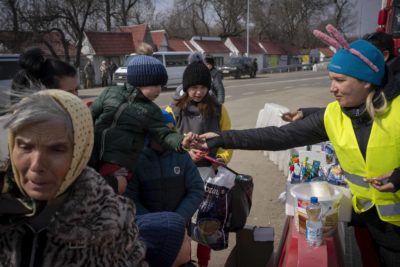
One month after the beginning of the invasion, civilian and military deaths continue to mount in Ukraine. Russian efforts around Kyiv appear to have stalled with continued resistance by Ukrainian forces. Millions of Ukrainians, including tens of thousands of Jews, are still attempting to flee the country.
- Ukraine launched a counter-offensive in southern Ukraine seeking to take advantage of public protests in Russian occupied areas, such as Kherson. Ukraine continues to fight to prevent Russia from encircling Kyiv. On Monday, the Ukrainian Armed Forces stated that Ukraine had recaptured Makariv, a town 40 miles west of Kyiv that lies on the highway between Kyiv and western Ukraine.
- On Tuesday, the Ukrainian government said that about 100,000 people remained in Mariupol, a city that was home to 400,000 before the war. Food and water are scarce in the besieged city. On Wednesday, Ukraine accused Russia of seizing rescue workers and drivers from a humanitarian convoy seeking to supply Mariupol, while the Red Cross confirmed that the convoy was not able to enter the city.
- Also on Tuesday, a US Defense Department official said that Russian forces were “struggling on many fronts” and that Russian combat power in Ukraine had dropped below 90% of its original 150,000 force. At the same time, the US National Security Advisor Jake Sullivan said, “This war will not end easily or rapidly.”
- Russia is widening its crackdown on internal dissent. On Tuesday, already imprisoned opposition leader Aleksei A. Navalny was sentenced to nine years in prison on fraud charges. Russia also expanded its censorship law to criminalize “discrediting” the activities abroad of any governmental body. The spreading of “false information” about the invasion is punishable with up to 15 years in prison.
- President Biden is travelling to Brussels to meet with the European Union and NATO. He is expected to announce new sanctions on Russian lawmakers. On Wednesday, NATO’s chief Jens Stoltenberg said that NATO would double its number of battlegroups in the region.
- As of March 21, the United Nations High Commissioner for Refugees reports that the number of refugees fleeing Ukraine has now reached 3.56 million. Poland is hosting over 2.1 million, 543,000 fled to Romania, 367,000 to Moldova, 317,000 to Hungary, and 250,000 to Slovakia. The International Organization for Migration estimates that almost 6.5 million people are displaced within Ukraine.
- The Buchenwald and Mittelbau-Dora Memorials reported on Monday that Boris Romantschenko, a 96-year-old non-Jewish survivor of four Nazi concentration camps, died last week when his building in the Ukrainian city of Kharkiv was shelled by Russian forces.
ISRAEL
On Sunday, President Zelensky addressed 119 members of the Israeli Knesset by Zoom. The speech was also broadcast to thousands of antiwar protesters at Tel Aviv’s Habima Square. Zelensky called for Israel to provide greater assistance to Ukraine and criticized the country for failing to provide arms to Ukraine, take in larger numbers of refugees, and enforce greater sanctions against Russia. Later on Sunday, Zelensky thanked Prime Minister Bennett for his efforts to mediate between Russia and Ukraine.On Monday, Prime Minister Bennett responded, “We are managing this unfortunate crisis in a sensitive, benevolent and responsible manner, while balancing the various considerations – and they are complex.” Bennett noted that Israel is providing humanitarian aid and accepting Ukrainian olim and some non-Jewish refugees.President Zelensky’s speech brought discussions in Israel about his comparisons to the Holocaust. Prime Minister Bennett said on Tuesday that he is prepared to visit Kyiv if negotiations between Ukraine and Russia reached a sufficient level of seriousness.The Israeli “Kohav Meir” (Shining Star) field hospital in Mostyska, Ukraine officially opened on Tuesday with the playing of the Israeli and Ukrainian national anthems. Our Jewish Federation is helping to fund their work through our partner agency JDC. A team of medical professionals led by Dr. David Dagan will arrive at the hospital on Monday and will be joined by 60 staff members from the Sheba Medical Center. The hospital is part of Israeli humanitarian efforts and is scheduled to be active for at least one month. It will contain an emergency ward, a delivery ward, and several other departments.Three Israeli-Ukrainian citizens were arrested Monday and then released by Russian forces in the occupied Ukrainian city of Melitopol. The Komuk family said that they had been detained for protesting the Russian invasion.
FLEEING UKRAINE, FEDERATIONS, AND PARTNERS ON THE GROUND
In one month since the fighting began, Jewish Federations have raised more than $39.5 million for Ukrainian relief efforts (click here to see how first funds in are impacting in the field). Our national Jewish Federations Special Allocations Committee has already met twice to designate funds for Ukrainian relief efforts being undertaken by Federation partners The Jewish Agency for Israel, The American Jewish Joint Distribution Committee, and World ORT, as well as to United Hatzalah, Hillel International, Nefesh B’Nefesh, HIAS, the Israel Trauma Coalition, Hadassah Medical Organization, Chabad, and Shma Yisrael.This week, a group of Jewish Federations leaders from across the country joined in a second JFNA humanitarian aid mission to Poland, where they met with aid providers from Federation partner organizations, visited the Ukrainian border, and listened to refugees as they gave their harrowing accounts of fleeing a brutal war.Last Friday, Jewish Federations sent a letter signed by 376 national and local Jewish and faith organizations, urging the Biden Administration to expedite admissions for Ukrainian refugees with close family ties in the United so they can wait in the U.S. in safety, with their families. We are awaiting next steps, however in the meantime, 17,000 Lautenberg (religious minority) applications are being processed and we expect that these refugees will be admitted to the U.S. in the coming months, as well as those admitted on family visas. Jewish Federations, in partnership with the Network of Jewish Human Service Agencies, will be sharing resources about community resettlement efforts soon, as the situation develops. On Monday, The Jewish Agency for Israel launched its Aliyah Express program to expedite the immigration process for Ukrainian olim. Since the war began, 4,000 Jewish refugees have made Aliyah. The Jewish Agency expects that number to increase significantly. The American Jewish Joint Distribution Committee (JDC) has significant operations on the ground in Ukraine working with the population under fire, and along the border, working with refugees who have managed to escape.JDC reports the following latest numbers:
- 10,000 Jewish refugees have been evacuated from Ukraine by JDC.
- 2,000 beds on average are occupied in JDC-supported facilities where refugees receive three meals each day.
- Last week, JDC sent 10 social workers to map refugees’ needs and available social support networks in Poland, Moldova, and Romania.The Jewish Agency and JDC have both established emergency hotlines to assist the Jewish community in Ukraine.
World ORT’s schools in Ukraine are physically closed, but the Odessa, Chernivtsi, and Belaya Tzerkov schools are continuing to learn remotely. Online sessions with psychologists are available to offer counseling for children and adults. Across Ukraine, ORT school principals are assessing how many students have left their cities and the country and how many have remained. At the same time they are gathering information about the needs of the families including financial support required, supply of medicines and whatever else may be needed. Some students from ORT Schools in Russia and Ukraine have moved to the Baltic states and have enrolled in ORT schools there, and more are expected in the coming days and weeks. Others have gone to schools in Europe. ORT students who have arrived in Bulgaria and Romania are now connected with Jewish schools there. A directory of contacts from schools across the ORT network has been shared with ORT Ukraine parents to contact for assistance.
Dozens of Israeli and Jewish organizations are working to provide humanitarian relief for Ukraine.
Jewish Federations have activated our emergency protocols and are working closely with the Government of Israel and our partners to do everything in our power to support efforts that ensure the safety and well-being of the entire Jewish community in Ukraine.

